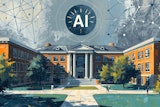DENVER
In perhaps the first event of its kind, educators and
researchers from the University of Colorado-Denver’s Latino/a Research
and Policy Center held a symposium on legislation, research, and its
impact on the Latino community. The symposium was held in early January
at the State Capitol on the opening day of the 1998 state legislative
session.
The gathering was designed to give Latino legislators an
opportunity to update researchers on their legislative priorities. In
effect, it was intended to synchronize the center’s research with the
legislators’ political agenda in a state where at least 13 percent of
the population is Latino.
In explaining the rationale for the symposium, Mike Cortes,
co-director of both the event and the center (along with Estevan
Flores), recently wrote that the goal of academicians is the pursuit of
truth and applying their research to die complex political problems of
our times.
“Sometimes, [however), the truth-seeking business makes us look
politically irrelevant. Politicians and voters often ignore our work,
even when it has implications for public policy, especially if our
findings are politically inconvenient,” he said.
As an example, Cortes cited the abundance of research that shows
that bilingual programs — when properly run — improve student
achievement; that immigration is not the primary cause of Latinos’
rapid population growth; and that discrimination against people of
color is still rampant. Despite this, he argued, there is a growing
hostility toward bilingual education, immigration, and affirmative
action.
Researchers fail to influence public policy, according to Cortes,
because too often they fail to ask the right questions. Researchers
must use their intellectual freedom and autonomy more strategically.
“We must formulate questions that matter to policy makers and the
voters and the interest groups who influence them,” he said. “The key
is to formulae research problems that focus on specific decision
opportunities that politicians are likely to have in the foreseeable
future.”
Based on that premise, the purpose of the symposium was to examine
upcoming legislation on which the legislators would like to see more
research. Of the legislature’s 120 members, eight are Latino. Seven of
these legislators attended the symposium.
Among the issues addressed by the legislators were education,
bilingual education, and affirmative action. Gloria Leyba, state
legislator and a member of the centers, advisory council, stated,
however, that tax reform is “the largest issue, before the assembly
this year.” in seeking property tax relief, many legislator will seek
to place greater emphasis on sales taxes, she said, which is the most
regressive form of taxation and which disproportionately hurts the poor.
“We have to see how that will affect Latinos,” she insisted.
Additionally, with a greater emphasis on school choice, ensuring,
equitable funding for public education is of paramount importance
because “that’s where most Latinos attend school,” Leyba said.
According to the Co the Department of Education, high school
dropout rate for latinos in the state was approximately 38 percent for
the class of 1997, and Latinos consistently score lower on standardized
tests than their White peers. Cortes stressed that affirmative action
will be at the top of the legislative agenda and will be very divisive
this year.
The legislators expressed a deep interest in identifying research
that would support their efforts. One of the reasons there is sometimes
a disconnect between researchers and the communities they aim to study
is that universities do not reward community work, said Cortes. Many
professors also are so busy writing for approved academic journals that
they can not publish the results of their findings in community media,
where it is most needed, he added.
Cortes hopes this will not be the case at The Latino/a Research and
Policy Center. The center’s research associates come from all four
University of Colorado campuses, Colorado State University, and other
institutions of higher education. It also includes community associates
such as the Latin American Research and Service Agency (LARASA) and
other community research, labor, and activist organizations. Cortes
believes this configuration will ensure that the center’s work is
relevant to the Latino community.
One strategy Cortes said the center hopes to employ, so that
professors will have more time to work on community problems without
getting penalized, is assisting them in getting outside grants. Doing
so will make “it easier to do research on problems that address Latino
populations.”
Other concerns addressed at the symposium included health care,
welfare reform, and community economic development. They also stressed
issues of taxes and their disproportionate impact on the elderly —
especially elderly women of color, who are on pensions.
The state’s burgeoning prison-building activity was another
concern. Since 1984, there has been a tripling of Colorado’s prison
population. Today, it houses 12,000 prisoners, at a cost of $30,000 per
bed.
“Building prisons at the expense of educating children is a bad trade-off,” Cortes said.
The legislators said they will try to put a cap on the state’s
prison population and will make an effort to allocate more money for
higher education.
COPYRIGHT 1998 Cox, Matthews & Associates
© Copyright 2005 by DiverseEducation.com















